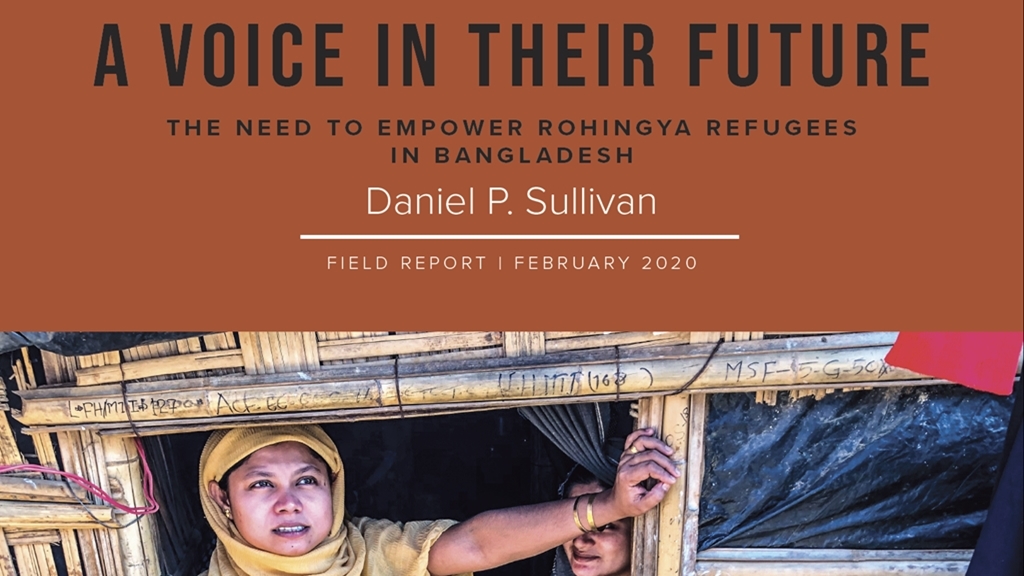
A Voice in Their Future: The Need to Empower Rohingya Refugees in Bangladesh
- 07/02/2020
- 0
By Daniel P. Sullivan, Refugees International
Summary
More than two years since the expulsion of the majority of the Rohingya population from Myanmar, Rohingya are still not being adequately informed or engaged on issues of vital importance to their lives and futures. The government of Myanmar continues to deny citizenship and representation to the few hundred thousand Rohingya still living in Myanmar. The Rohingya there face ongoing, severe human rights abuses, including restrictions on their freedom of movement and access to livelihoods and education. Bangladesh deserves great credit for providing refuge to 1 million Rohingya. With the support of UN agencies, nongovernmental organizations (NGOs), and donor countries, it has led a massive humanitarian response that has saved many lives. Bangladesh also refuses to recognize Rohingya as refugees however and has been increasing restrictions on that population. Moreover, Rohingya voices have been virtually absent from high-level discussions about their possible repatriation to Myanmar or relocation within Bangladesh, as well as decisions about matters of everyday camp life.
Key actors—including the governments of Bangladesh and Myanmar and UN agencies—all have made official statements that the ideal solution to the Rohingya displacement crisis is their repatriation to Myanmar. However, none of the three repatriation agreements that have been signed between these actors formally include the Rohingya or even mention the name Rohingya. Engagement with the Rohingya community has been limited to poorly coordinated, last-minute information campaigns rather than genuine consultations, and have left its people largely uninformed and unprepared for any possible return. The dangers of this approach were clear in two repatriation exercises that led to widespread angst among Rohingya refugees. The first attempt, in particular, resulted in panic, spikes in mental health consultations, and even reported suicide attempts. The second, although better managed to avoid the same levels of panic, still led to extensive anxiety and uncertainty.
Similarly, plans by the government of Bangladesh to move 100,000 Rohingya refugees to Bhasan Char, an island in the Bay of Bengal, have created confusion and fear among them. Bangladeshi authorities in the camps have collected and added Rohingya names to relocation lists, reportedly without those individuals’ consent. Rumors abound about what those who do volunteer to relocate might receive for relocating. UN officials and NGO representatives have warned about serious unanswered questions over safety guarantees and the logistical capacity to host refugees on the island. Plans for assessment by a UN technical team have been delayed. Under current circumstances, no transfers should take place. An independent assessment and outreach to the Rohingya community will be essential to ensure that any relocations are truly safe and voluntary.
Meanwhile, the lack of a representative structure constrains Rohingya refugees’ ability to address challenges that arise in everyday camp life, from service provision to redress for grievances. Currently, the role of the Rohingya in camp management is largely limited to the majhi system. The majhi—the leaders of sections of the camps—are Rohingya selected by the Bangladesh military at the start of the crisis, but with little regard for community sentiment. Bangladeshi authorities have allowed the UN Refugee Agency (UNHCR) to implement a community representation system in four of the 34 camps, but the government has been reluctant to expand it further.
The shortcomings of the majhi system are exacerbated by gaps in the efforts of humanitarian actors to communicate with the refugee community. UN agencies and NGOs have tried to improve communication with communities by setting up information booths, hotlines, and other feedback mechanisms. However, Rohingya are often not consulted in the early phases of project design and implementation. They also face language and other barriers to engagement that have not been adequately addressed.
The rise of a budding civil society within the Rohingya refugee population has helped to fill some of the representation gaps on broader issues. Groups like the Arakan Rohingya Society for Peace and Human Rights, Shanti Mohila, and the Rohingya Women’s Empowerment and Advocacy Network have risen to prominence. Their representatives have attended a UN Human Rights Council session and even briefly met with U.S. President Donald Trump as part of the 2019 Ministerial to Advance Religious Freedom.
Even this promising trend has been reversed in recent months, however. As part of a broader “securitization” in Bangladesh’s approach toward the Rohingya, authorities have cracked down on Rohingya civil society in camps and placed greater scrutiny and restrictions on NGOs supporting their work. While Bangladesh has legitimate security concerns linked to the camps, overly restrictive policies are counterproductive to addressing such risks and detrimental to its own interests. New policies tightening restrictions on the Rohingya have ranged from aggressive confiscation of phones and SIM cards to the initiation of fencing around the camps.
Such policies not only risk harming the Rohingya now but—by further excluding refugees from livelihoods and skills-building opportunities—will hinder the prospects for any future sustainable return of Rohingya to Myanmar. Bangladesh’s January 2020 decision to expand access to education for Rohingya youth is a promising step back from this trend, but too many restrictions remain. In particular, restrictions on their movements further prevent Rohingya’s representation and engagement in decision-making forums. For example, uncertainty about Bangladesh’s more restrictive policies likely contributed to the fact that no Rohingya refugees were present at the first-ever Global Refugee Forum in December 2019.
Any sustainable solution to the plight of the Rohingya must include their participation, which starts with addressing the root causes of Rohingya suffering in Myanmar. Increasing international pressure on Myanmar to create conditions conducive for return will be essential. In the meantime, much more can and must be done to empower Rohingya refugees and ensure they are included in discussions that will define their fates. Until it is safe for Rohingya to return to their homeland, their voices must be supported and amplified, not restrained and stifled.
